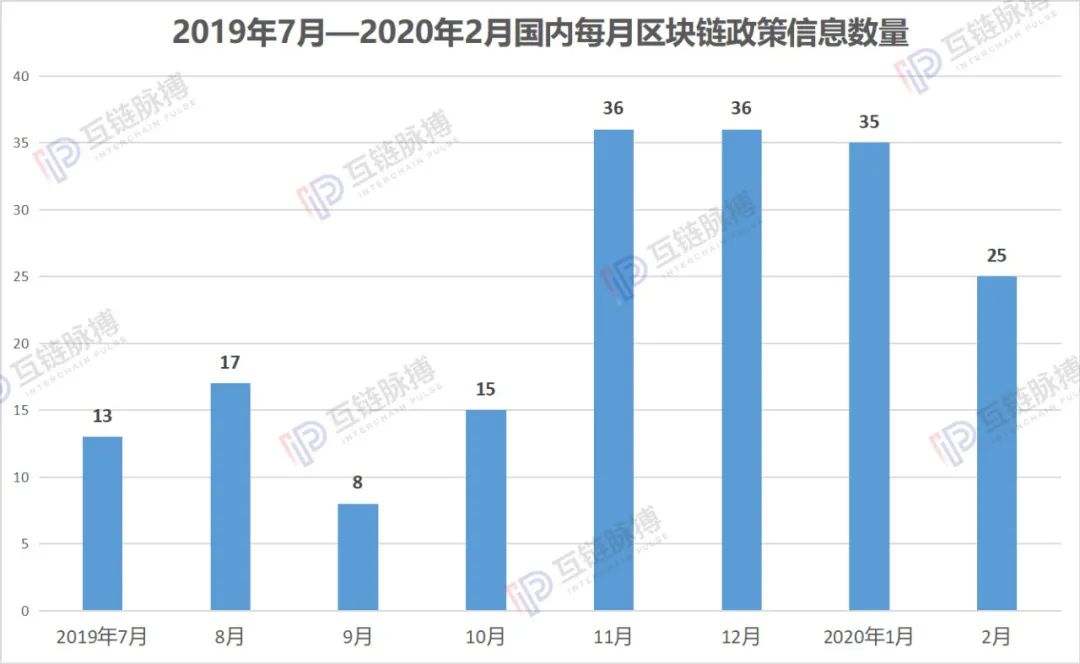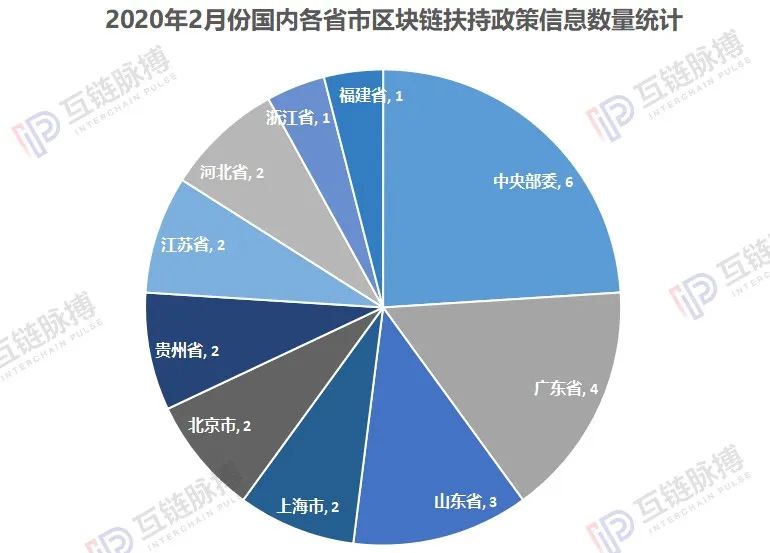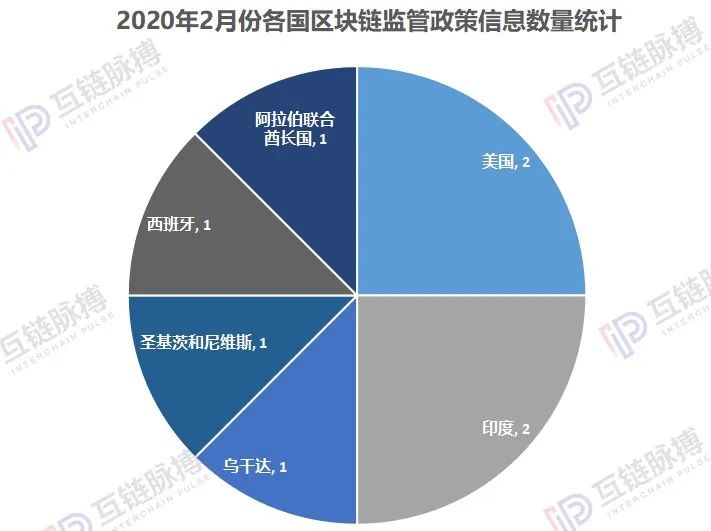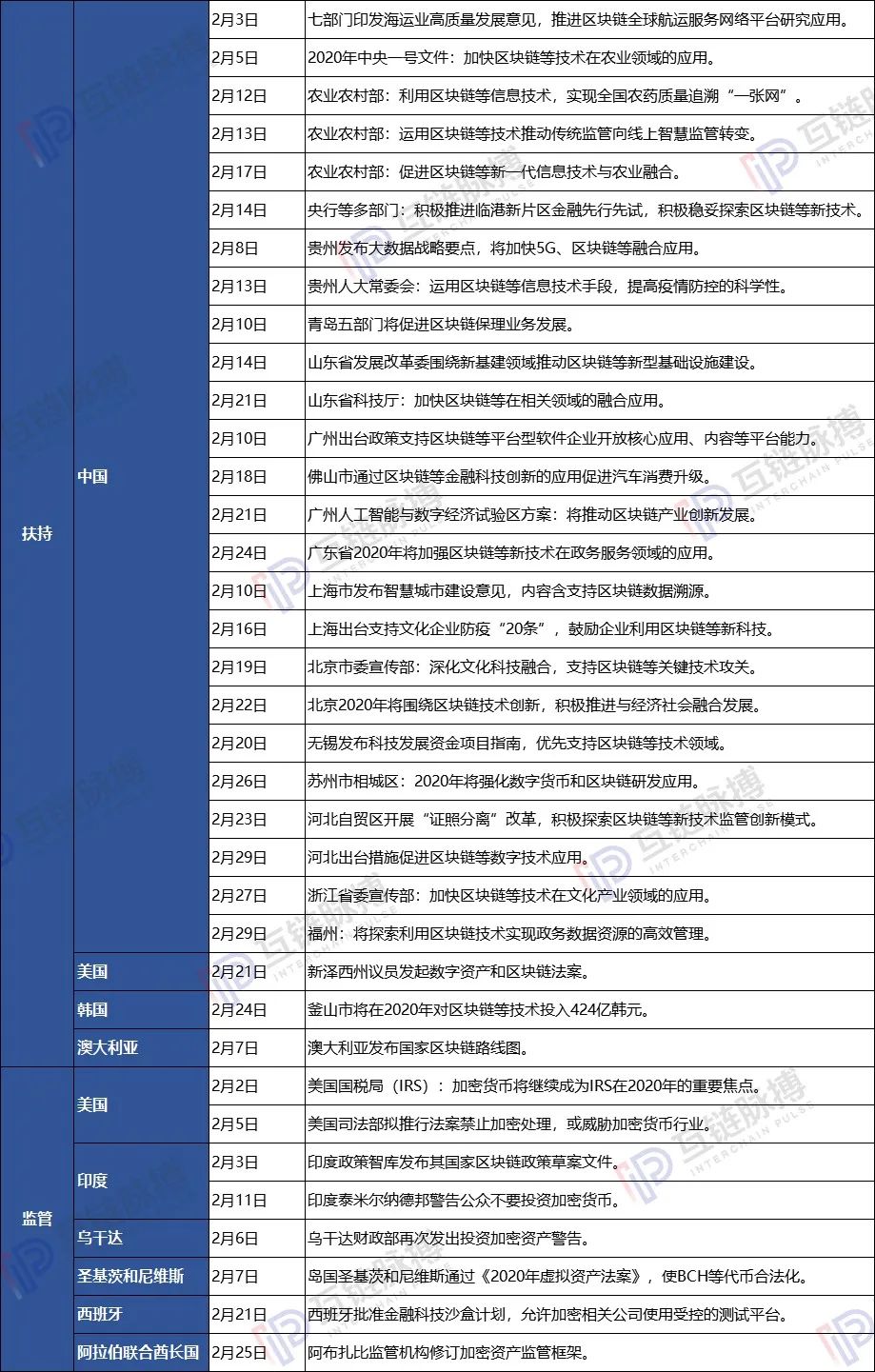Overview of the global blockchain policy in February: most of the domestic efforts to help prevent and control the epidemic, Guangdong and Shandong are supporting
Source: Interlink Pulse, the original title "Interlink Monthly Report | February Global Blockchain Related Policy Releases Declined, Guangdong and Shandong Support Strongly"
Author: Kim go car
Reprinted without authorization!
In February, the number of global blockchain-related policy releases declined.
- New blockchain financial development accelerates: Hong Kong plans to oversee virtual currency service providers, Deutsche Börse launches reverse Bitcoin ETP
- Short market exhausted, BTC rebounded to $ 8,800
- "Black Horse" Exchange FTX Receives Liquid Value to Participate in Round B Investment, The Next Crypto Unicorn Is Coming Soon
Observing the pulse of each other, domestically, since the statistics, in February this year is the first month in China that there has been no regulatory and standardized development policy of the blockchain industry. On the one hand, it is supportive and encouraged. Among them, Guangdong and Shandong have issued the most relevant policies.
In terms of foreign countries, in terms of quantity, blockchain policies have declined significantly. Observing the policy information of various countries, the supervision of cryptocurrency investment is still the key direction. At the same time, some countries have promoted the development of the blockchain and cryptocurrency fields through supervision.
Domestic Blockchain Policy: Mostly use the blockchain to help prevent and control the epidemic
According to public information statistics, in February 2020, no domestic blockchain regulatory policy information was disclosed. Not only that, the amount of domestic blockchain support policy information also declined, with a total of 25. According to the statistical chart, the "peak period" of the policy release at the end of the year and the year has passed.

The mutual chain pulse is further observed. In February, the central ministries and commissions disclosed a total of six blockchain support policies. Among them, four policy documents are related to the agricultural sector. In 2020, the first document of the Central Committee proposed to accelerate the application of blockchain and other technologies in the agricultural field. In mid-February, the Ministry of Agriculture and Rural Affairs proposed the use of blockchain technology in three key points.

Among the provinces and cities across the country, the most disclosed blockchain policy information in February was Guangdong Province, with a total of 4 blockchain support policy information. In the areas of automobile consumption, artificial intelligence and the digital economy, government affairs, precision poverty alleviation and other multi-business areas, the development requirements for the blockchain are put forward.
On February 10th, Guangzhou issued a policy to support platform software companies such as blockchain to open up core application and content platform capabilities, and introduce users, traffic, interfaces, technology, product promotion and other resources for developers; news on February 18th , Foshan City, Guangdong Province proposed measures to encourage automobile consumption. The government will promote the upgrading of automobile consumption through the application of blockchain and other fintech innovations;
On February 21, the Guangzhou Artificial Intelligence and Digital Economy Pilot Area Program was launched, which will create a Guangzhou Artificial Intelligence and Digital Economy Pilot Area in Guangzhou with Pazhou as the core, the Pearl River as the tie, and the integration of industrial development and surrounding areas. Promote the agglomeration and development of the digital industry, the innovation and development of the blockchain industry, and the digital transformation of key industries; on February 24, Guangdong Province announced the “Working Points for the Reform and Construction of the Digital Government of Guangdong Province in 2020”. The "Points" propose to study and promote the construction of a blockchain-based data sharing system and government application platform, and conduct exploration in areas such as precision poverty alleviation, real estate registration, etc., and initially form representative blockchain technology innovation government service applications. Scenes.
After Guangdong Province, Shandong Province disclosed a total of 3 blockchain policy information in February. It is mainly in the context of epidemic prevention and control and resumption of production that it has introduced more policies to promote the application of blockchain in order to leverage its technological support capabilities.
Media reports began on February 8. During the resumption of production in Qingdao enterprises, five departments, including the Qingdao Local Financial Supervision Bureau and the Private Economic Development Bureau, carried out financial support for enterprises to resume production and resume production. The five departments will promote blockchain factoring. business development;
Since February 10, all parts of the country, on the basis of ensuring epidemic prevention and control, have been pushing for the orderly resumption of major projects. The Shandong Provincial Development and Reform Commission released news and planned to screen 1021 provincial key projects. Among them, around the new infrastructure field, promote the construction of new infrastructure such as blockchain;
On February 21, the Shandong Provincial Department of Science and Technology formulated and promulgated "Several Measures on Scientifically Supporting Effective Service Technology Innovation for the Prevention and Control of New Crown Pneumonia Epidemic Situation." These include accelerating the integration and application of blockchain and other technologies in related fields and improving the support capabilities of emergency management technology.
In addition to Shandong Province, Guizhou Province, Shanghai, Hebei Province and other provinces and cities, based on the specific situation of the epidemic prevention and control, have also introduced corresponding policies, using blockchain technology to help the epidemic prevention and control, and support the development of SMEs.
On February 13, the Standing Committee of the People's Congress of Guizhou promulgated the "Decision of the Standing Committee of the People's Congress of Guizhou Province on the Scientific and Orderly Prevention and Control of New Coronavirus Pneumonia and Resolutely Winning the Fight Against Epidemic Prevention and Control". The "Decision" stated that "the full use of information technology such as big data, blockchain, artificial intelligence and other methods to effectively improve the scientificity, timeliness and effectiveness of epidemic prevention and control."
On February 16, the Propaganda Department of the Shanghai Municipal Party Committee promulgated "Several Policies and Measures to Fully Support and Serve the Cultural Enterprise's Steady and Healthy Development of Epidemic Prevention and Control." One of them pointed out that cultural enterprises are encouraged to make full use of new technologies such as blockchain to cultivate new formats such as e-sports, digital animation, online travel, smart media, and digital cultural blogs, and support a number of high-growth innovative small and medium-sized cultural enterprises.
On February 29, Hebei introduced ten specific measures to deal with the impact of the new crown pneumonia epidemic and support the development of high-tech enterprises and high-tech zones. Measures are proposed to promote the widespread application of digital technologies such as blockchain in epidemic surveillance analysis, prevention and treatment, and resource deployment in high-tech zones.
Foreign Blockchain Policy: Cryptocurrency Investment Supervision Is Still the Key
Inter-chain pulse statistics, the number of foreign blockchain policies in February also declined to a certain extent. There are only 3 pieces of policy information related to blockchain support, and 8 pieces of policy information related to blockchain supervision.

In terms of support, it is worth noting that the Australian government launched a national blockchain strategy on February 7. The new policy roadmap aims to make Australia's nascent blockchain industry a global leader and make Australia's wine, banking and finance industries a key priority area.
In fact, Australia has always maintained a prudent regulatory attitude towards the development of the blockchain, and at the same time, has set certain expectations, so the government has tried a variety of ways in the blockchain field. In January 2020, the Reserve Bank of Australia also stated that it was considering a digital version of the country's currency, the Australian dollar, to enable digital currency commercial banks and other companies across Australia to speed up transactions.
South Korea continued to focus on funding support in February. On February 24th, the Busan municipal government stated that it had determined the implementation plan for informatization in 2020. Judging from the plan, the Busan City Government has invested 42.4 billion won in 22 projects that lead the smart technology in the fourth industry, including blockchain.
In terms of regulation, the first regulatory information to be introduced in February was the United States. According to news on February 2, the IRS said that cryptocurrencies will continue to be an important focus in 2020. The mutual chain pulse observation, since May 2019, the IRS has continued to strengthen the supervision of cryptocurrency taxation, and in the second half of 2019, nearly 10 crypto tax related regulatory policy information was launched. In addition, during February, the U.S. Department of Justice also proposed a bill to ban cryptographic processing, which may threaten the cryptocurrency industry.
With the exception of the United States, Interchain Pulse is concerned that the regulation of cryptocurrency investment is still a key concern for countries.
On February 6, the Uganda Ministry of Finance issued another warning on investing in crypto assets; on February 11, the Tamil Nadu Police Department issued a new warning that the public should avoid using cryptocurrencies. Although the Reserve Bank of India has previously clarified that digital assets are not illegal in the country. But according to the warning, those who continue to invest in cryptocurrencies should be blamed given that the RBI has not yet approved businesses to provide cryptocurrency-related products or services.
At the same time, it is worth noting that Spain, Saint Kitts and Nevis are promoting the development of the blockchain and cryptocurrency fields through supervision.
Spain approved a fintech sandbox in late February that will allow blockchain and cryptocurrency-related companies to use a controlled test platform before putting their products on the market; the island nations of Saint Kitts and Nevis in early February Passed the 2020 Virtual Assets Act, which aims to provide cryptocurrency regulation to businesses and residents in the country, and the bill legalizes digital currency assets such as Bitcoin Cash.
Interchain Pulse Blockchain Policy Statistics in February 2020:

We will continue to update Blocking; if you have any questions or suggestions, please contact us!
Was this article helpful?
93 out of 132 found this helpful
Related articles
- A picture tells you what the central bank's digital currency (CBDC) can meet consumer needs
- The Blockchain Electronic Invoice Extreme Edition is launched on WeChat.The fastest time to open the invoice is 30 minutes.
- British insurance giant Lloyd's to provide insurance services for cryptocurrency holders
- Blockchain Industry Development Monthly Report: Blockchain Financing Market Meets Cold Again in February, Fiat Digital Currency Track Is Hot
- Observation | OKEx triggers "destruction war", why is absolute deflation worth learning in the currency circle?
- Industry Blockchain Weekly 丨 Baidu's financial report mentions blockchain again
- Research | How Does Blockchain Technology Promote the Transformation of Charities?






